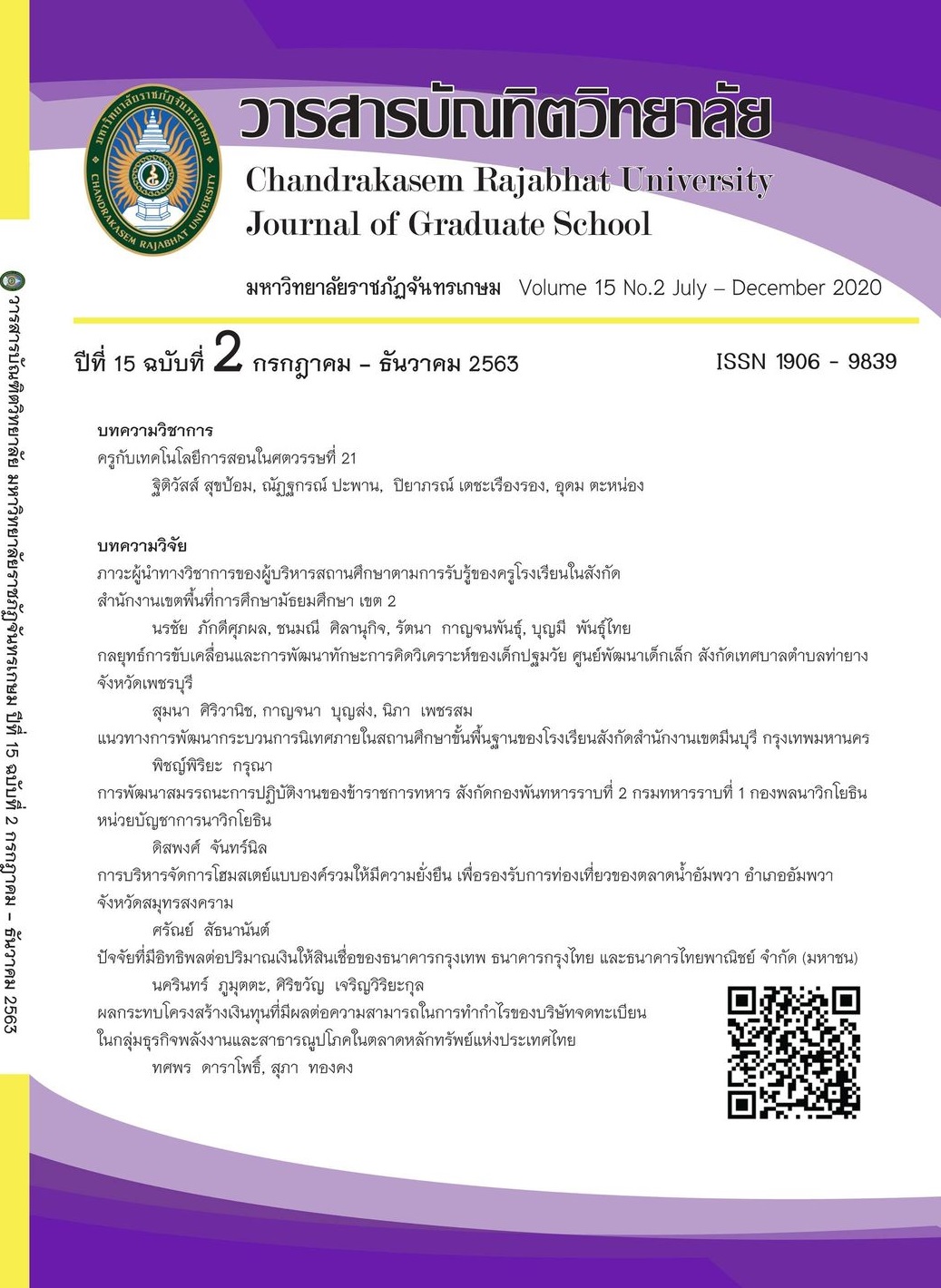กลยุทธ์การขับเคลื่อนและการพัฒนาทักษะการคิดวิเคราะห์ของเด็กปฐมวัย ศูนย์พัฒนาเด็กเล็ก สังกัดเทศบาลตำบลท่ายาง จังหวัดเพชรบุรี
Main Article Content
บทคัดย่อ
จากการประเมินคุณภาพภายนอกของสำนักงานรับรองและประเมินคุณภาพการศึกษา (องค์การมหาชน) ได้พบปัญหาคือ เด็กปฐมวัยขาดทักษะการคิดวิเคราะห์ ผู้วิจัยจึงสนใจทำวิจัยเรื่องนี้โดยมีวัตถุประสงค์เพื่อ (1) พัฒนากลยุทธ์การขับเคลื่อนการพัฒนาทักษะการคิดวิเคราะห์ของเด็กปฐมวัย (2) พัฒนากลยุทธ์การพัฒนาทักษะการคิดวิเคราะห์ของเด็กปฐมวัย และ (3) ศึกษาผลการพัฒนาทักษะการคิดวิเคราะห์ของเด็กปฐมวัย ศูนย์พัฒนาเด็กเล็ก สังกัดเทศบาลตำบลท่ายาง จังหวัดเพชรบุรี กลุ่มเป้าหมายที่ใช้ในการวิจัย ได้แก่ หัวหน้าศูนย์พัฒนาเด็กเล็ก จำนวน 7 คน ครู จำนวน 15 คน เด็กปฐมวัย อายุ 3-5 ปี จำนวน 165 คน เครื่องมือที่ใช้ในการวิจัย ได้แก่ คู่มือ การพัฒนาทักษะการคิดวิเคราะห์ของเด็กปฐมวัย และแบบทดสอบทักษะการคิดวิเคราะห์ของเด็กปฐมวัย สถิติที่ใช้ คือ ร้อยละ ค่าเฉลี่ย และส่วนเบี่ยงเบนมาตรฐาน
ผลการวิจัยพบว่า (1) กลยุทธ์การขับเคลื่อนการพัฒนาทักษะการคิดวิเคราะห์ของเด็กปฐมวัย มี 4 กลยุทธ์ คือ กลยุทธ์เครือข่าย กลยุทธ์การทำงานเป็นทีม กลยุทธ์การมีส่วนร่วม กลยุทธ์การบูรณาการ โดยมีคู่มือกลยุทธ์การขับเคลื่อนทักษะการคิดวิเคราะห์ของเด็กปฐมวัย ศูนย์พัฒนาเด็กเล็ก สังกัดเทศบาลตำบลท่ายาง จังหวัดเพชรบุรี เป็นกรอบในการดำเนินการ (2) กลยุทธ์ที่หัวหน้าศูนย์พัฒนาเด็กเล็กและครู ใช้ในการพัฒนาทักษะการคิดวิเคราะห์ของเด็กปฐมวัย คือ การจัดประสบการณ์การเรียนรู้วิทยาศาสตร์สำหรับเด็กปฐมวัย ภายใต้กรอบการดำเนินการของคู่มือกลยุทธ์การขับเคลื่อนทักษะการคิดวิเคราะห์ของเด็กปฐมวัย ศูนย์พัฒนาเด็กเล็ก สังกัดเทศบาลตำบลท่ายาง จังหวัดเพชรบุรี และ (3) ผลการพัฒนาทักษะการคิดวิเคราะห์ของเด็กปฐมวัย ศูนย์พัฒนาเด็กเล็ก สังกัดเทศบาลตำบลท่ายาง จังหวัดเพชรบุรี คิดจากร้อยละของความก้าวหน้า เพิ่มขึ้นร้อยละ 52.60 มีผลการพัฒนาทักษะการคิดวิเคราะห์ของเด็กปฐมวัย หลังการจัดกิจกรรมสูงกว่าก่อนการจัดกิจกรรมอย่างน่าพอใจ
Article Details

อนุญาตภายใต้เงื่อนไข Creative Commons Attribution-NonCommercial-NoDerivatives 4.0 International License.
เอกสารอ้างอิง
กระทรวงศึกษาธิการ.(2560). หลักสูตรสถานศึกษาและการพัฒนาหลักสูตร. กรุงเทพฯ: โรงพิมพ์คุรุสภาลาดพร้าว.
นิทรา ช่อสูงเนิน. (2556). การพัฒนายุทธศาสตร์การจัดการเรียนรู้เชิงประสบการณ์เน้นการสืบเสาะเพื่อเสริมสร้างความสามารถในการคิดเชิงเหตุผลและความสามารถในการแสวงหาความรู้ของเด็กปฐมวัย.วารสารบัณฑิตศึกษามหาวิทยาลัยราชภัฏสกลนคร, 10(5), หน้า 54-65.
มณฑา จำปาเหลือง. (2554). การบริหารการศึกษาการบริหารเชิงกลยุทธ์. เพชรบุรี: คณะครุศาสตร์ มหาวิทยาลัยราชภัฏเพชรบุรี.
รัฐธรรมนูญแห่งราชอาณาจักรไทย พุทธศักราช 2560. (2560, 6 เมษายน 2560). ราชกิจจานุเบกษา. เล่ม 134. สืบค้นจาก http://lib.nbtc.go.th/ebook_detail?cid=14540&ctype=3&tag=realbook.
สมบัติ เจริญเกษและบัญญัติ ชำนาญกิจ. (2557). ผลการจัดประสบการณ์แบบวิทยาศาสตร์ที่มีต่อความสามารถในการคิดวิเคราะห์ของเด็กปฐมวัย. วารสารวิชาการเครือข่ายบัณฑิตศึกษามหาวิทยาลัยราชภัฏภาคเหนือ, 4(6), 117-128.
สุมาลี หมวดไธสง. (2554). ความสามารถในการคิดวิเคราะห์ของเด็กปฐมวัยที่ได้รับการจัดกิจกรรมกระบวนการทางวิทยาศาสตร์นอกห้องเรียน. (วิทยานิพนธ์ปริญญามหาบัณฑิต). กรุงเทพฯ: มหาวิทยาลัยศรีนครินทรวิโรฒ.
สำนักงานรับรองมาตรฐานและการประเมินคุณภาพการศึกษา. (2558). รายงานผลการประกันคุณภาพการศึกษา พ.ศ. 2558. กรุงเทพฯ: ศูนย์พัฒนาเด็กเล็กบ้านท่าคอย. สำนักงานรับรองมาตรฐานและการประเมินคุณภาพการศึกษา.
Smith, B. (1994). Teacher Quality of Work-Life According to Teacher: The Case of High Schools. Dissertation Abstracts International, 55(04), p. 826-A.


